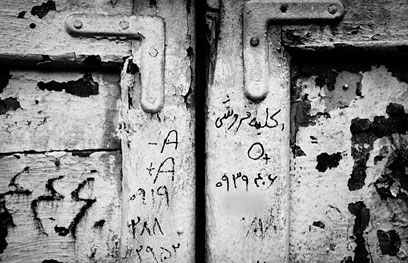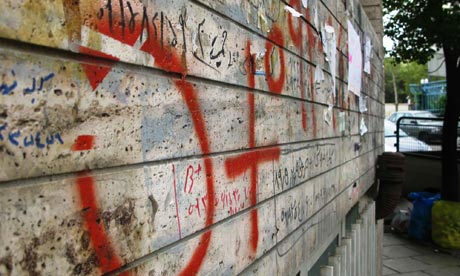An
article in Haaretz describes the market for kidneys ("kidney bazaar"
בזאר הכליות) in Iran, and includes this picture of ads written on a wall in Tehran.
"Qasemi Mustafa, head of Kidney Patients Support Association in Iran, said the average sum received by the donors ranged around $ 6,000 [paid by the recipient]. The Government adds that another thousand dollars."
HT: Ran Shorrer
Here's a closely related story in the Guardian:
In the only country where the organ trade is legal, the streets near hospitals have been turned into a 'kidney eBay'
"Iran is the only country where the selling and buying of kidneys is legal. As a result, there is no shortage of the organs – but for those trying to sell a kidney, there is a lot of competition.
...
"Competition means that some ads have been torn down. Some have added their information to ads by other donors. Others have placed their ads on people's doors or simply written them in marker pen on trees where they think they will catch people's attention.
"At the heart of the capital, near the Charity Association for the Support of Kidney Patients (CASKP), the number of ads has made the streets of Tehran into a sort of kidney eBay.
...
"Iran's controversial kidney procurement system, which has been praised by many experts and criticised by others, allows people to sell and buy kidneys under the state-regulated surveillance of two non-profit organisations, the CASKP and the Charity Foundation for Special Diseases. These charities facilitate the process by finding potential vendors and introducing them to the recipients, and are charged with checking the compatibility of a possible donation and ensuring a fair trade.
"After the transplant, the vendor is compensated by both the government and the recipient. In an interview with the semi-official Mehr news agency, the CASKP's director, Mostafa Ghassemi, estimated the total official price list to be around 7m rials, of which 1m is paid by the government. Iranians are not allowed to donate kidneys to non-citizens.
"In 2010, a total of 2,285 kidney transplants took place in the country, of which 1,690 kidneys were supplied from volunteers and 595 from those clinically brain-dead," he said. According to Mehr, the majority of people selling kidneys are aged 20-30. Despite the state control, bureaucracy and time-consuming procedures have left the door open for non-official direct negotiations, making the Iranian system more like a kidney market.
"Dr Benjamin Hippen, a transplant nephrologist with the Carolinas medical centre in North Carolina, US, has studied successes, deficiencies and the ambiguities of the Iranian system.
"Making a judgment about whether the 20-year-old system as a whole has been successful was complicated, he said. "The majority of those selling kidneys in Iran are disproportionately poor, and information about the long-term outcomes for sellers is quite limited. Too, it is increasingly clear that there are many different systems, rather than a single unified system in Iran.
"That said, Iran appears to have successfully addressed the shortage of organs, incentives for organs have not substantially attenuated the growth and development of organ procurement from deceased donors, and reported outcomes for recipients have been favourable."
"Comparing Iran with Pakistan, where organ trafficking is nominally illegal but still occurs, Hippen, who is an associate editor of the American Journal of Transplantation, said: "It seems to me that if Iran had not developed a system of incentives, the situation there today would look very much like the state of affairs in countries such as Pakistan."
"In the US, more than 100,000 people were estimated to be on the waiting list for kidney transplants in 2010 – waiting lists were eliminated in Iran in 1999.
"Hippen has pointed out that "since 1999, more than 30,000 US patients with kidney failure have died waiting for an organ that never arrived".
"Arguing in favour of allowing people to sell their kidneys, Sue Rabbitt Roff, a senior research fellow at the University of Dundee, said last year that it was time to "pilot paid provision of live kidneys in the UK under strict rules of access and equity".








